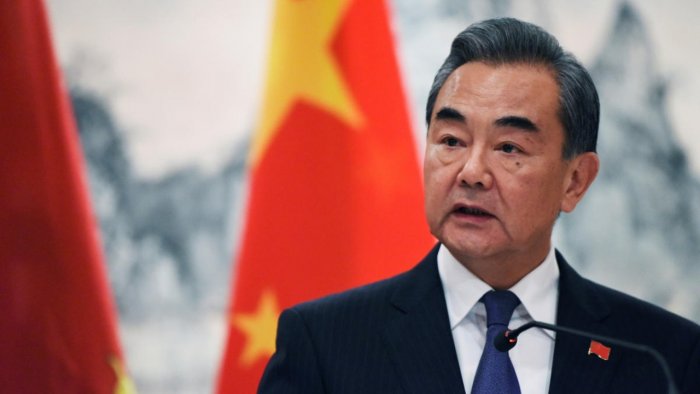Virendra Pandit
New Delhi: The sole objective of Chinese Foreign Minister Wang Yi’s whirlwind, three-nation tour of Pakistan, Afghanistan, and India, may have been to keep the status quo ante in South Asia as Beijing, taking advantage of the West’s prolonged engagement with Russia, prepares to fish in the Taiwanese waters.
He visited the Organization of Islamic Cooperation (OIC) foreign ministers’ meeting at Islamabad as a “special guest”. The 57-member OIC, headquartered in Jeddah, Saudi Arabia, has now become a toothless tiger, particularly after non-Arab countries like Turkey, Pakistan, and Malaysia tried to ‘hijack’ it three years ago to promote their own national agendas on this Muslim platform.
It carries little force as the Arabs are cautious of the non-Arab countries’ moves. That is why Pakistan’s attempts to enlist support for the Kashmir “cause” have come to naught. Even the Taliban-controlled Kabul snubbed Pakistan by sending not Afghanistan Foreign Minister Amir Khan Muttaqi but an official, Muhammad Akbar Azeemi.
Wang Yi’s principal aim for the Islamabad visit may have been to keep the Muslim nations, particularly the Arabs, in good humor to ensure a continued supply of energy from the Middle East. None of these uninterested countries raised the Uyghur Muslims’ human rights issues, worried as they are about their own economies, stability, and geopolitical standing.
India has already rebutted Wang’s remarks on Jammu and Kashmir, saying the affairs of the Union Territory is an entirely Indian matter.
Wang also visited Afghanistan to keep ruling Taliban on Beijing’s side, or at least neutral, as their spill-over into Xinjiang or Gwadar through Balochistan, could make it messy for the USD 60 billion China-Pakistan Economic Corridor (CPEC), which Beijing is trying to develop as a land-route for the Middle East oil to China.
But his visit to New Delhi was even more significant.
There is no reason to believe that President-for-Life Xi Jinping’s smile for India is any different from Chairman Mao Zedong’s own smirk at India’s Charge de Affair Brajesh Mishra in 1970 when the Chinese dictator singled him out at an event. Such hollow niceties in diplomacy carry no weight in realpolitik and are used to sow confusion in the rival’s mind and craft the desired narrative.
That is why Wang Yi’s Friday meetings in New Delhi with External Affairs Minister S. Jaishankar and National Security Advisor Ajit Doval carry little meaning. Both Dr. Jaishankar and Doval, according to the media reports, could get nothing concrete on the table from the visiting guest.
So, why did Wang Yi visit India at all?
In September 2019, the Indian Navy had forced the People’s Liberation Army (PLA)’s “research ship” to return after its unauthorized entry into India’s exclusive economic zone in the Andaman Sea.
India’s outpost in the Andaman and Nicobar Islands, scattered between the Bay of Bengal and the Andaman Sea, is closer to Myanmar and Indonesia than the Indian mainland. Its southern isles lie near the top of the Malacca Straits, a gateway to the Indian Ocean and through which China gets three-quarters of its oil from the Middle East.
While engaging the Indian Army along the Line of Actual Control (LAC), particularly in Eastern Ladakh, China is also trying to warm up to the Indian Navy in Port Blair, where India has a strong naval presence. This is to ensure an uninterrupted oil supply as India could plug the Malacca Straits and starve China of the energy supply from the Gulf. The alternative CPEC route Beijing has tried to open up via land is vulnerable to Pakistani and Afghan terrorists.
That is why Wang Yi’s sudden tour of South Asia, during the Russia-Ukraine war, has little meaning for India.
This reflected in what Dr. Jaishankar said on Friday after his three-hour-long talks with Wang Yi. He said the current situation between India and China on the Eastern Ladakh issue is “a work in progress” but moving at a slower pace than desirable. He asserted that the restoration of normal ties will require normalcy in border areas.
He noted that 15 rounds of talks between senior military commanders have taken place over the standoff and pointed out that progress has been achieved on several friction points from the disengagement perspective.
Dr. Jaishankar said he discussed with Wang bilateral relations that have been disturbed because of Chinese actions since April 2020 in Eastern Ladakh.
Frictions and tensions arising from China’s deployments since April 2020 cannot be reconciled with a normal relationship between two neighbors, he asserted.
Likewise, NSA Ajit Doval, after his hour-long meeting with the Chinese Foreign Minister, stressed the need for complete disengagement on the LAC to allow the bilateral relationship to take its natural course. Pointing out that continuation of the present situation is not in the mutual interest, he said that restoration of peace and tranquillity will help build mutual trust and create an enabling environment for progress in relations, the media reported.
Wang and Doval are special representatives for China and India, respectively, on the LAC issues.

